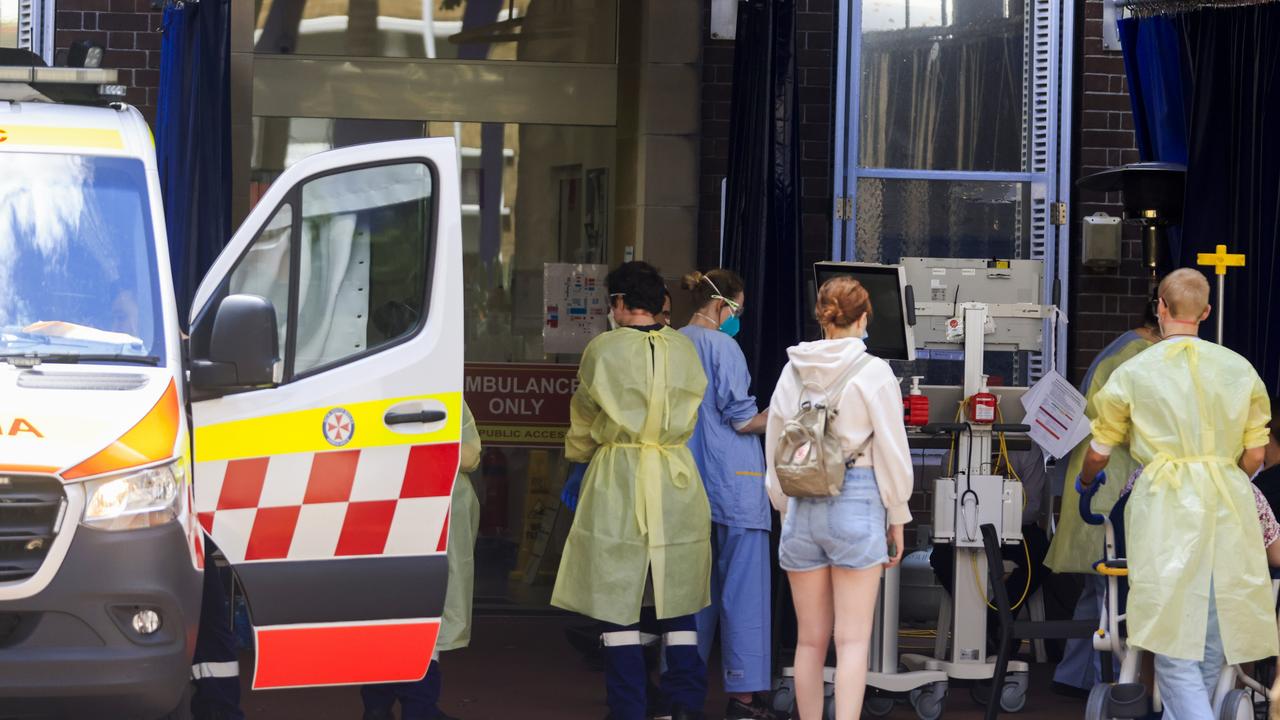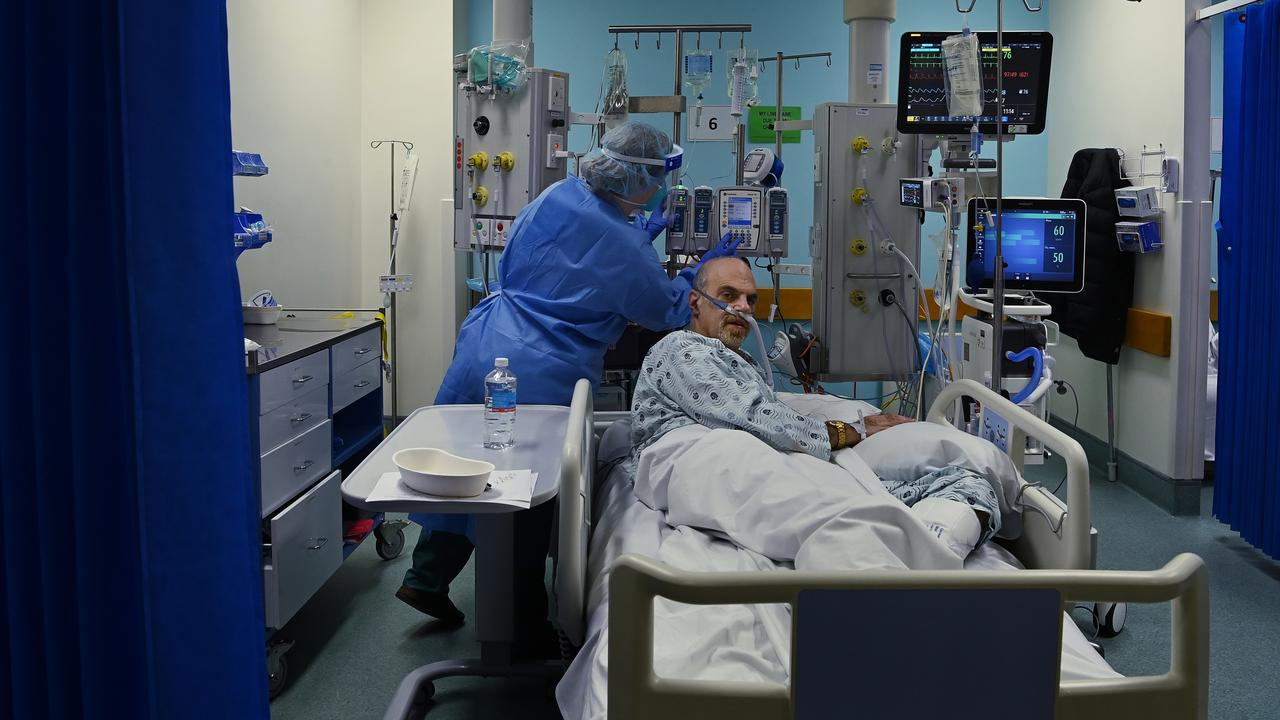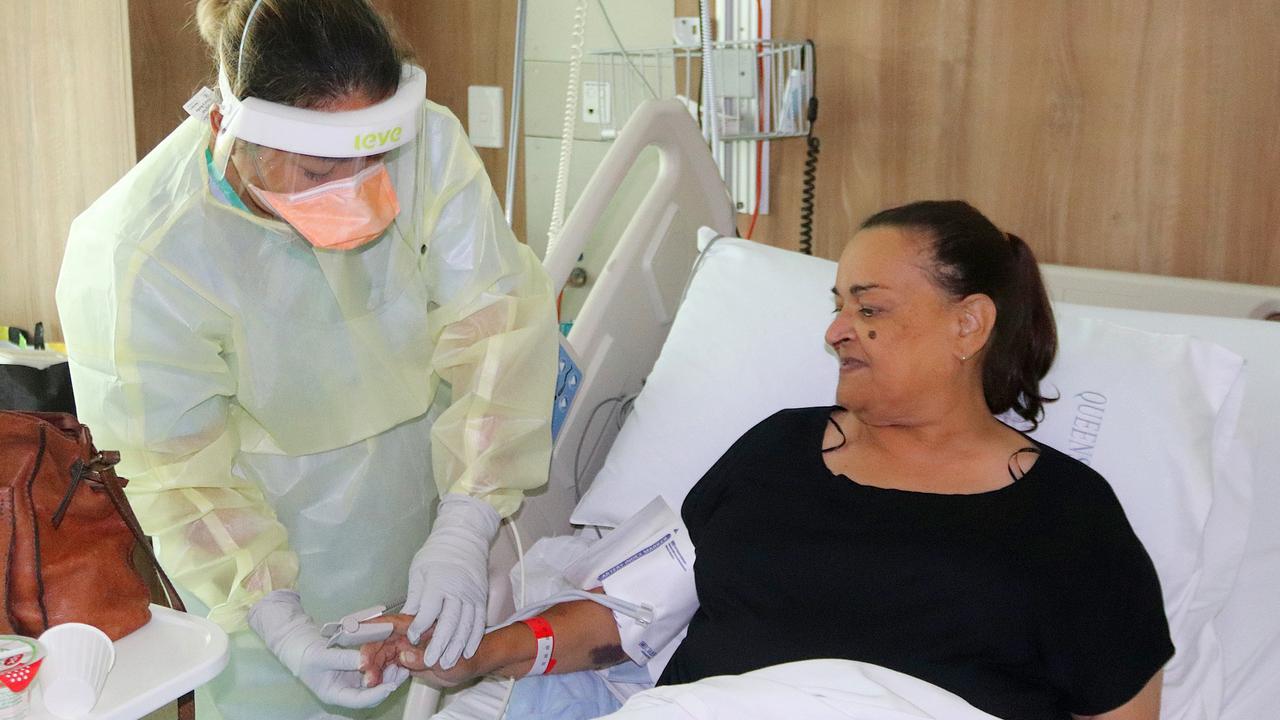Patients left ‘screaming in pain’ amid elective surgery bans while doctors sit idle
Australians have been left “screaming in pain” despite doctors being available to perform procedures, with health experts saying the situation can’t continue.
Doctors and nurses have been left standing “idle” while patients deal with conditions that leave them “screaming in pain” due to arbitrary and unsustainable blanket bans on elective surgeries.
The Australian Medical Association (AMA) and the Royal Australasian College of Surgeons (RACS) are calling on all levels of government to develop a national plan to address the growing and increasingly critical backlog of elective surgeries.
Dr Jill Tomlinson, a board member of the AMA Victoria, and a specialist plastic, reconstructive and hand surgeon, said Victorians had endured 124 consecutive days of restrictions to elective surgery due to the pandemic, and this did not include other restrictions put in place in 2020 and 2021.
She said surgeries that had been disrupted included the removal of skin cancers, reconstructive surgery and treatment for people in severe pain that prevented them from working and doing other daily activities.
Sydney resident Keira, 23, is just one patient who has been impacted by the shutdown of “non-urgent” elective surgery.
She has had seven surgeries since she was diagnosed with endometriosis when she was 16 years old. Her most recent procedure took place on January 27 after she ended up in the emergency department two weeks earlier.
“In the lead-up to emergency, I was on slow-release morphine, Panadeine Forte and Endone (oxycodone) and I was still screaming in pain,” she told news.com.au. “I couldn’t sleep and my partner was up trying to calm me down from the pain I was in.”
Keira said she had been reluctant to go to emergency during the pandemic as it’s something authorities are discouraging unless people have life-threatening conditions. But she had been living with worsening pain for six months.
“There is a feeling of guilt about taking up people’s time … but you are in so much pain, what else do you do?
“You learn to live with it [the pain] but you can tell when there’s a certain type of pain, you can tell something’s wrong.”
A scan at emergency showed a thickened endometrium, which could have meant her endometriosis was back or that she had cancer. Surgery was needed to get a biopsy.
Keira was scheduled for a procedure within days of seeing her gynaecologist but the operation was cancelled after she was told hospital beds had to be held for possible Covid patients.
“How is this elective? What if it was something sinister? That’s a whole other week of delaying treatment.”

More Aussies now waiting longer than a year for surgery
The coronavirus pandemic has greatly disrupted elective surgeries across Australia including in South Australia and NSW, where authorities this week announced the staged resumption of non-urgent procedures from this month. Elective surgery in Victorian private and public hospitals continue to be on hold, although there is hope this ban will soon be lifted.
More recently the Victorian Government was forced to back down on the suspension of IVF procedures, and there have been some other arbitrary exemptions for paediatric surgery in South Australia as well as some cancer screening or cosmetic surgery at various times.
Health professionals are now calling for a better system to avoid continuing disruptions and uncertainty.
AMA NSW president Dr Danielle McMullen welcomed the 75 per cent resumption of elective surgery in NSW, but said there needed to be a plan for a full return.
“We urge the state to give patients certainty that elective surgeries will not be cancelled again as we learn to live with Covid,” she said.
“We’ve experienced three elective surgery shutdowns since the pandemic began.”
Dr McMullen said the state could not continue to use elective surgery to fix poor planning and workforce resourcing problems.
“We are not through the pandemic yet, and it’s anticipated there could be future waves of infection in winter,” she said.
“We need better planning and better solutions, for our patients’ sake. Suspending elective surgery should only be a last resort and a local decision based on capacity.”
The proportion of Australians now waiting for longer than a year for treatment has jumped up since the beginning of the pandemic.
Up to 7.6 per cent of people on elective surgery waiting lists waited longer than a year for treatment in 2020/21, up from 2.8 per cent in 2019/20, the latest data from the Australian Institute of Health and Welfare shows.
At the end of the third quarter of 2021, there were 92,276 patients on the waiting list.

‘Insane’ wait for surgery
Keira’s surgery was delayed for a week due to a ban in NSW and she said she endured “one week of excruciating pain” as they were unable to offer her any stronger painkillers.
It was the longest she’s had to wait for surgery as she is normally able to have procedures done within days. There was also the added stress of needing a biopsy to determine whether she had cancer.
While Keira was lucky to have been seen reasonably quickly, this was mainly because she could afford treatment through the private system.
“I feel sorry for people on waiting lists or who don’t have money for private health,” she said.
“I’ve been told if I go public it would be a 15-month wait. That is insane to me.
“It would be horrible to be in that much pain for that long, I think something needs to change.”
Keira said she doesn’t understand how treatment for endometriosis is considered an elective surgery.
“This is not an ‘elective’ disease. It has affected my life. I’ve had to quit numerous jobs, it affects my family, my relationships. I have had numerous large ovarian cysts removed – it’s had such a massive impact on my life.
“I’m baffled as to why it’s classified elective.”
Health professionals sitting idle due to blanket bans
The blanket bans also mean some operating theatres are left unused.
“It is very much the case that operating theatres, wards and health care workers are standing idle because elective surgery is essentially ceased in both public and private sectors,” Dr Tomlinson told news.com.au.
She said around 70 per cent of the elective surgery in Australia is performed in the private system. These surgeons are not employed by the hospitals as they essentially run small businesses and they are not “readily transferable” to public hospitals.
“While there are agreements between state governments and private hospitals to have private hospitals assist with Covid, there are currently private beds set aside for public patients that are not being filled,” she said.
For example, Dr Tomlinson said the blanket ban on elective surgery in Victoria did not take into account the different capacities of each health care facility and whether they were able to continue offering elective surgeries.
She compared this to the individualised approach being applied to event management where individual Covid safe plans had been developed for events and venues, worked out between the venue, public health and event teams.
“[Victorian] Health Minister Martin Foley has ended up with a plan for each venue, that’s fit for purpose and fit for venue – and that’s what we need to do with the health care system,” Dr Tomlinson said.

While some have raised concerns that workers in the public health care system were tired and overworked, Dr Tomlinson said this was a separate issue.
“Where there is capacity in the system to continue performing essential surgery, we can’t place that on hold or hold that ransom because other components are filled with tired and overworked individuals,” she said.
“We are not using elective surgery staff to assist those individuals who are so overworked. It’s not due to lack of will, it’s because the skills and individuals are not transferable.”
She said the widespread cancellation of elective surgery caused people to lose out on essential health care.
“The narrative to keep elective surgery stopped to help the public health system with the Covid response is a false narrative,” she said.
‘Failure of government’
While the AMA and RACS have both supported state government postponement of some elective surgeries to prevent the Covid surge from overwhelming public hospitals, they believe this approach is increasingly unsustainable.
“Two years into the pandemic and with a highly vaccinated population means that blanket suspensions of elective surgery should be only used as a last resort,” AMA Australia president Dr Omar Khorshid said.
“The fact that these are still happening points to the failure of governments to properly invest in public hospital capacity, as well as a failure to undertake the necessary planning needed to avoid this outcome.”
The organisations want an urgent plan to restore reasonable and acceptable access to elective surgery, as well as a long-term funding arrangement to ensure the backlog is cleared.
RACS president Dr Sally Langley said elective surgery was not an optional procedure – it was essential surgery.
“It is surgery to address often life-threatening conditions and conditions that prevent patients from living a normal life because of severe pain or dysfunction,” she said.
Both the AMA and RACS are calling for an urgent plan for the resumption of elective surgery as a priority in both private and public hospitals.
They say there is unused capacity in private hospitals in particular and these facilities should be brought back online for routine elective surgery as soon as possible.
Dr Khorshid said they would like to see a funded plan from state, territory and federal governments for clearing the surgery backlogs and supporting public hospitals.
“It then needs to be backed by real, long-term funding commitments that deliver permanent, expanded capacity in our public hospital system,” he said.
He said the waiting list figures were just the tip of the iceberg.
“As a result of the pandemic there has also been a reduction of specialist outpatient appointments, as well as limits on access to general practitioners meaning that people may not have seen their GP for an initial referral,” he said.
“The longer we wait to act on essential surgery, the sicker Australians will become, and the more expensive their care will be.”
Aussies resorting to ‘surgical tourism’
The only surgeries that have been able to proceed with any certainty have been category 1 surgeries, which need treatment within 30 days.
However, Dr Tomlinson said those who needed Category 2 surgeries, defined as those who need treatment within 90 days with conditions that can cause pain, dysfunction or disability, have seen significant delays to procedures.
Dr Tomlinson said one of her patients with a chronic condition that interfered with the use of their hands, had chosen to fly to Queensland for surgery rather than sit on a waiting list, after restrictions were introduced in Victoria in January 2020.
“It’s been very odd to have surgical tourism crop up in Australia as a result of the varying and arbitrary restrictions put in place in jurisdictions,” Dr Tomlinson said.

Dr Tomlinson said she had patients who had sustained workplace injuries and had been approved for treatment through WorkCover but had been unable to get the procedure done.
“Until they have the surgery and they recover they cannot return to work. They have been waiting for months for the surgery.”
Dr Tomlinson said doctors and other medical professionals were concerned about their patients and the disruption the Covid outbreak was having on their treatments.
“Elective surgery includes surgery necessary for diagnosing and treating cancer, including gastroscopies or colonoscopies, which are almost always category two and three surgeries,” she said.
“When there are restrictions on elective surgeries, there are restrictions on the diagnoses of conditions that have the potential to kill people.”
Cancer Council’s Victorian Cancer Registry report released in December last year found there were around 2400 Victorians who had not been diagnosed with cancer in 2020, but who would have expected to be diagnosed.
“That’s why doctors are stridently calling for the resumption of elective surgery and for a road map that sets out how we will deal with the ballooning waiting lists and the backlog of surgery cases,” she said.
“Let’s not have this arbitrary and unpredictable system again.”
‘It’s cruel to make people wait so long’
Amy, 36, is another Australian who has been suffering from debilitating pain and now needs to find $18,000 to pay for surgery in the private system.
The regional NSW resident has been told surgery to address severe pain for endometriosis and adenomyosis would take 12 months through the public system.
Despite being prescribed opioids, Amy says the pain is debilitating and she can barely get through each day. On top of the abdominal pain, she also gets shooting pain in her legs and back, as well as extreme fatigue and headaches.
“I’m on opioid medication just to have basic functioning during the day, so I can work for a few hours and get out of bed really. To get my nine-year-old son to school. Even driving can set off really bad pain. I feel like it affects me being able to be a good mum,” she said.
The pandemic caused extra delays in seeing her specialist with whom it was difficult to get an appointment even prior to Covid.
“He would suggest therapies like trying the pill (to control the endometriosis) for three months but because it was hard to get in to see him, I would be trying things for six to eight months that weren’t working.
“So when I got in to see him through a cancelled appointment and he suggested surgery I was really relieved but when he said I would need to wait over 12 months in the public system, it was really disappointing.
“I don’t think chronic pain conditions should be considered elective surgery. I think people going through debilitating things should be able to go through the system really quickly but this is just not the case.”
Amy said she has decided to go through the private system but will still need to wait until March or April for surgery to remove the endometriosis and to have a hysterectomy.
“I have to pay $18,000 because I just can’t wait for 12 months with this condition, I just can’t do it anymore. It’s too painful and it’s affecting my life too much,” she said.
“It’s just so frustrating that the wait through the public system is so long. It just seems cruel to make people wait so long.”

Amy said money for the surgery was coming out of a divorce settlement and so couldn’t be spent on other things, such as a deposit for a house or a much-needed new car.
She has also had to defer her nursing studies until after the surgery and the delay also means she has to continue relying on her ex-husband for help.
The couple separated in 2020 after years of trying to have a second child and amid worsening endometriosis pain for Amy.
“I think the endometriosis also impacted us. I was in so much pain and my husband was taking a lot of the load and it got to the point where he was exhausted,” she said.
“He’s still having to support me financially in a lot of ways. I’m trying to be independent but I have to rely on a lot of people for help and that’s something that worries me, that they will eventually not want to help anymore.
“I’m lucky I have such a good relationship with my ex-husband because I wouldn’t have been able to survive, but I also want to move on and have a separate life.
“I feel stuck at the moment and I’m really looking forward to having the surgery, and hope it will mean that all the things I’ve put on hold, I can start again, have a new life.”
Do you have a story? Email charis.chang@news.com.au






